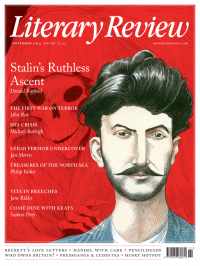David Cesarani
The Argentine Connection
Eichmann before Jerusalem: The Unexamined Life of a Mass Murderer
By Bettina Stangneth (Translated by Ruth Martin)
The Bodley Head 579pp £25
Adolf Eichmann’s notoriety waxed as his influence waned. During the Nuremberg Trials, a succession of defendants and witnesses fingered him in absentia. It became highly convenient to displace responsibility for the persecution of the Jews onto his shoulders. Contrary to what many historians (including myself) have assumed, in the immediate postwar years Eichmann was targeted by Jewish organisations hunting Nazi criminals and wanted by both the British and the Americans. This was partly why he decided to flee his hideout in northern Germany in 1950 and make for Argentina.
Bettina Stangneth would like to persuade us that Eichmann was a notorious character as early as 1938. She certainly demonstrates that he was not merely a back-room boy of the SS who shunned publicity. He cultivated an image and used his infamy among German Jews as a tool for manipulating

Sign Up to our newsletter
Receive free articles, highlights from the archive, news, details of prizes, and much more.@Lit_Review
Follow Literary Review on Twitter
Twitter Feed
Under its longest-serving editor, Graydon Carter, Vanity Fair was that rare thing – a New York society magazine that published serious journalism.
@PeterPeteryork looks at what Carter got right.
Peter York - Deluxe Editions
Peter York: Deluxe Editions - When the Going Was Good: An Editor’s Adventures During the Last Golden Age of Magazines by Graydon Carter
literaryreview.co.uk
Henry James returned to America in 1904 with three objectives: to see his brother William, to deliver a series of lectures on Balzac, and to gather material for a pair of books about modern America.
Peter Rose follows James out west.
Peter Rose - The Restless Analyst
Peter Rose: The Restless Analyst - Henry James Comes Home: Rediscovering America in the Gilded Age by Peter Brooks...
literaryreview.co.uk
Vladimir Putin served his apprenticeship in the KGB toward the end of the Cold War, a period during which Western societies were infiltrated by so-called 'illegals'.
Piers Brendon examines how the culture of Soviet spycraft shaped his thinking.
Piers Brendon - Tinker, Tailor, Sleeper, Troll
Piers Brendon: Tinker, Tailor, Sleeper, Troll - The Illegals: Russia’s Most Audacious Spies and the Plot to Infiltrate the West by Shaun Walker
literaryreview.co.uk